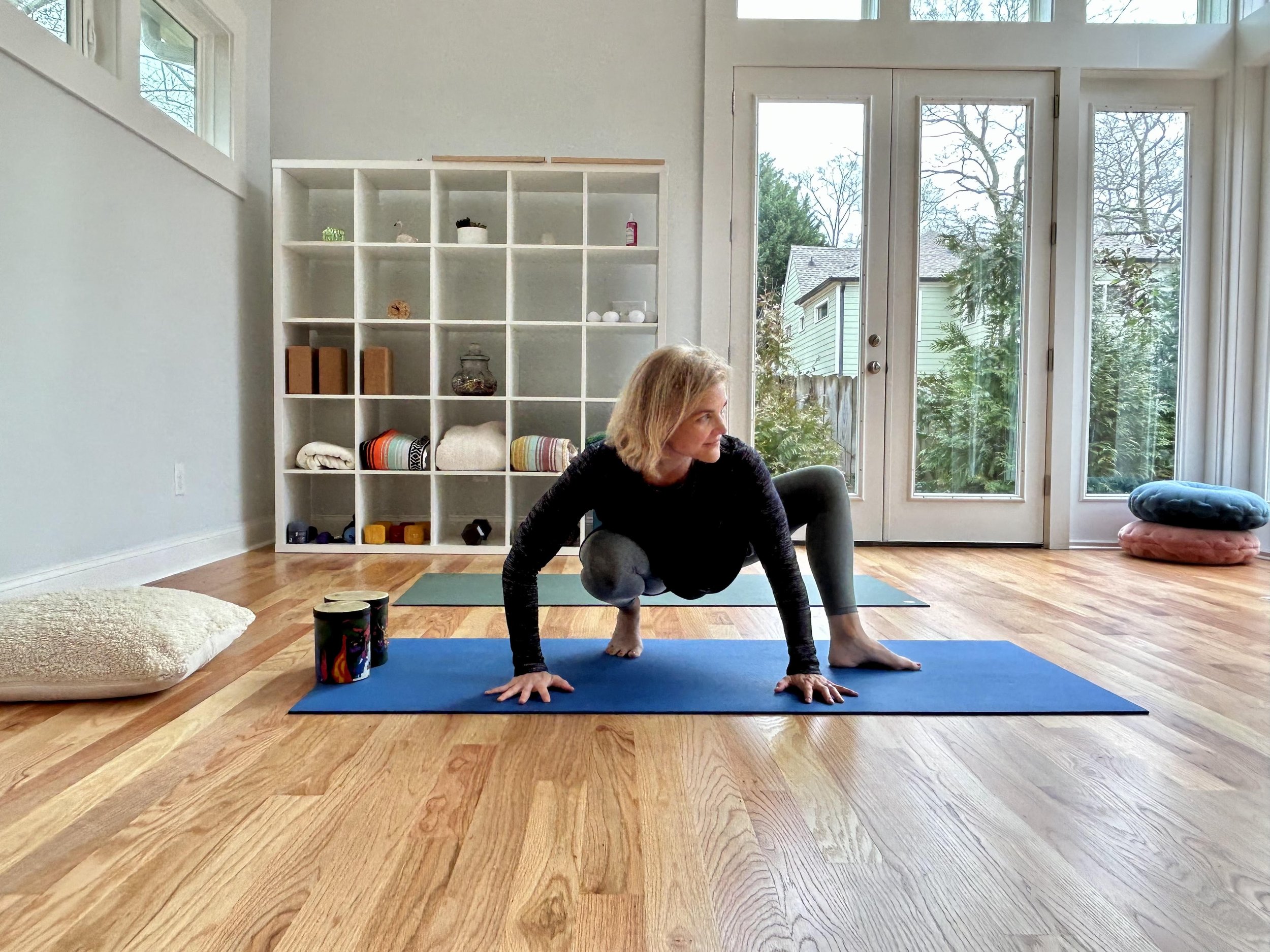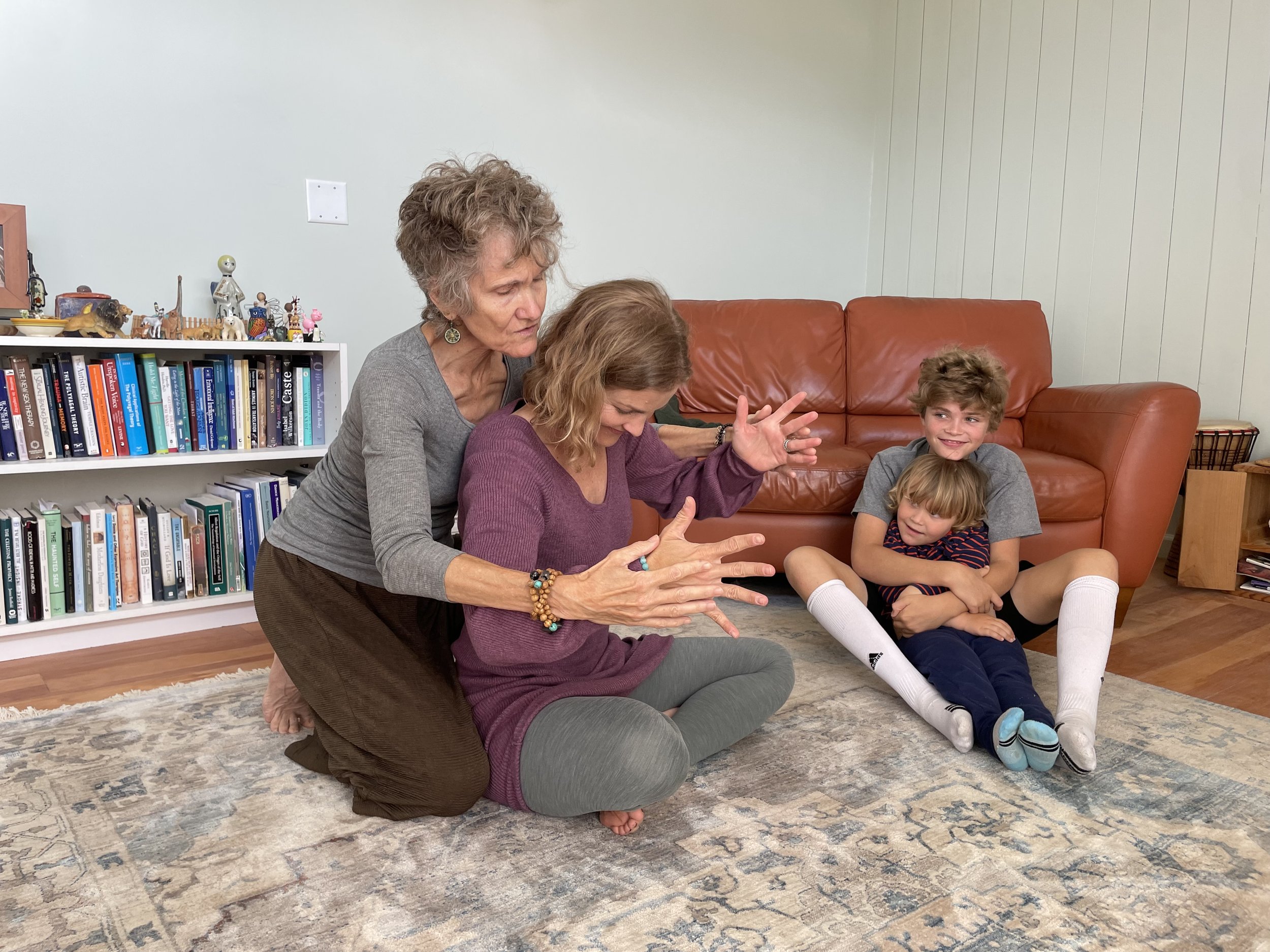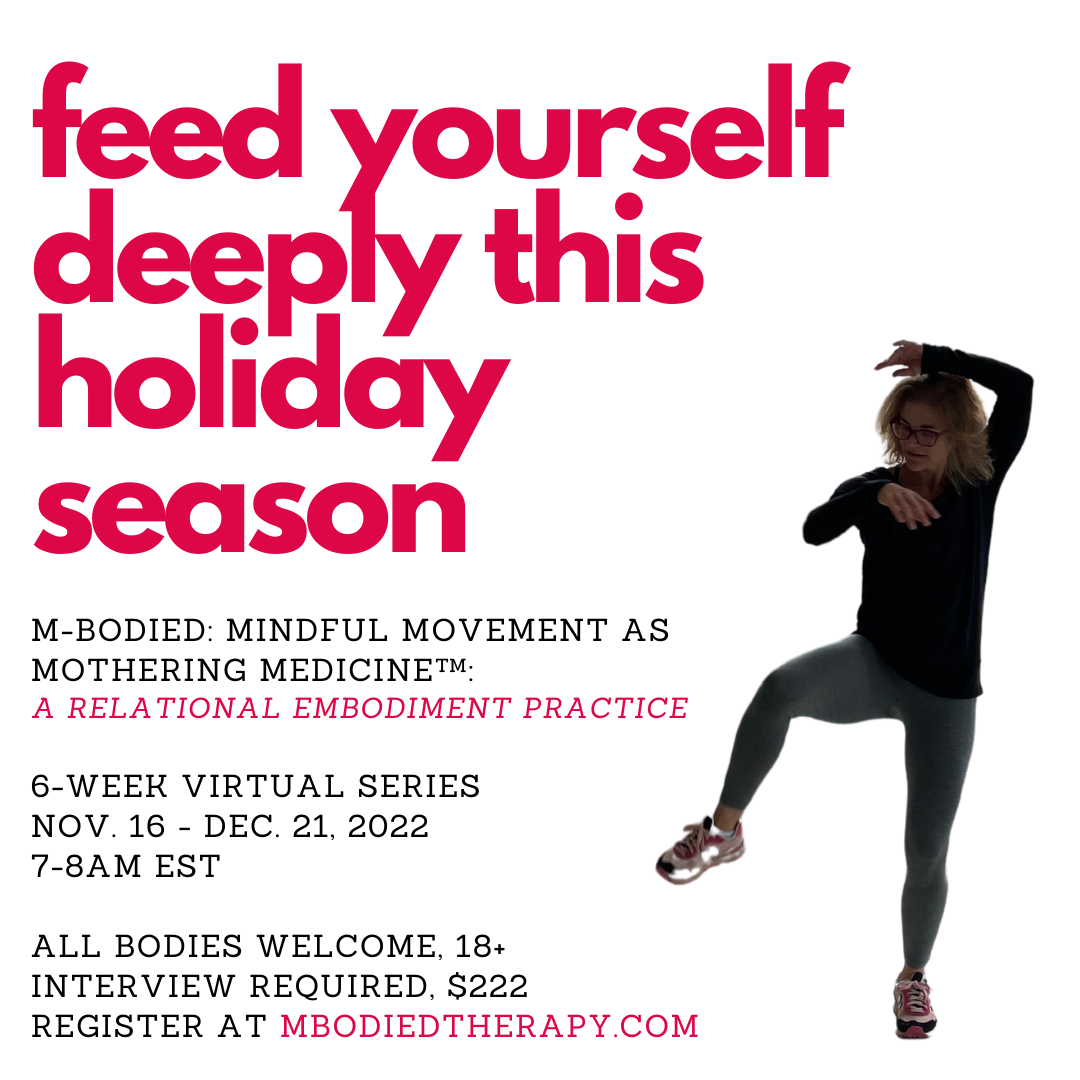National Stop Bullying Day!
It’s National Stop Bullying Day!
Whether bully energy pokes at the water cooler, the playground, or online, both kids and adults feel the jabs, and they can sting. But they don’t have to.
Instead of making someone the “bad guy” or the “good guy,” M-Bodied helps people to recognize the roots of bullying behavior in an effort for healing, repair and growth.
Instead of bursting other people’s bubbles to build oneself up, and instead of letting other people burst one’s bubble, M-Bodied supports elders move through their own big feelings in order to more presently support the next generation.
From Dieting & Disembodying to Deeper Nourishment - Part 1
On Dieting as a Distraction
Diet culture is sneaky. Weight stigma is concerning. We used to stand in line to weigh at Weight Watchers stripmall stores. Now, Noom ads and macro-counting apps tempt us to count points, portions and protein on-the-go, privately, conveniently, all day long. Plus, elimination diets, intermittent fasting and GLP-1 medications (the medicalization of weight loss rather than blood sugar management) could feel like more to consider, but conflicting messaging from various providers about side effects, long-term effectiveness and for whom can feel confusing, even shaming, like yet another distraction, another roadblock to body attunement.
If you struggle with body appreciation and diet culture, it is not your fault. To be responsive to your body’s cues, to be flexible in your thinking, to move in exploratory rather than anxious-ridden or frozen ways are all experiences we learn in relationships along the way. If we are chronically starved for connection, our body receives these imprints, and we become physiologically and psychologically conditioned to survive until we have support to explore new ways of living, of eating, of relating, of moving into the world.
From Dieting & Disembodying to Deeper Nourishment - Part 2
Dieting as Clues to Deeper Hungers
Instead of looking at chronic dieting, compulsive eating or exercise, or body image blues as fixed states of distress or pathology to be swallowed or consumed with another cookie cutter plan or quick fix, what if you consider them as clues to discovering your deeper hungers, your appetite for life?
If your relationship to dieting could reveal a deeper relationship to your self, your matter, how do you release your desperate grasp on counting, weighing, binging, restricting?You know that “just stopping” a behavior or urge or compulsion is really darn hard, if not impossible, and there’s good reason: Your body doesn’t want to restrict or feel deprived or feel stuffed or feel worn out, it wants you to pay attention to its deeper callings. Your body craves support and nurturance, but it needs relational support rather than another lonely deprivation and binge cycle.
Caroline and Nick Gebhardt contribute to newly published book Parental Control: A Guide to Raising Balanced Kids in the Digital Era
M-Bodied® Coaching is thrilled to announce that both Caroline and Nick Gebhardt were featured and contributed to children's technology expert Titania Jordan’s newest release Parental Control: A Guide to Raising Balanced Kids in the Digital Era. Drawing from her expertise as a co-founder of Bark Technologies, a leading internet safety company as well as her own personal experience as a parent of a teenager, Jordan explores the good, the bad, and the ugly aspects of how the digital world is affecting children both today, and tomorrow.
Caroline Gebhardt, who is a licensed mental health counselor and parent coach, offered her expertise about early brain/body development and the need for connection with elders for co-regulation rather than an increase of relying on screens. She focuses on how parents and elders get to be the anchors, the Circles of Support, for their children at various stages of development and how to navigate the digital dimension for embodiment rather than disembodiment.
What Stand By Your Man Means Today
Early on, when our elders can catch and celebrate our bites, recognize them as the spaciousness and primal energy we need for moving into ourselves. We don’t need to, using Resmaa Menakem’s words, blow pain through other bodies, onto our peers, our children, our lovers, our neighbors, our fellow citizens.
My mother saw man after man in her life store secrets. Heartbreaking, shameful secrets passed down to their male bodies, nevertheless, damning to others. Quick fixes, like infidelity and addictions, don’t produce long term gains but long term pain. When generations of children are not invited to be who they are, their life energy, their prana, their chi is stored deep in the crevices of their core, their pelvis, hidden unfairly from their own sense of self. Reaching for relief, normalized by the culture of misogyny, tells men it’s okay to grab a woman by the pussy to fix what feels wrong about themselves.
Somatic Therapy for Family Nourishment - Part 2
Connection Trumps Control
In my Somatic Therapy for Family Nourishment - Part 1 blog post, I wrote about the relational process of invitational care and how it offers more sustainable bodily and relational healing. I used examples of my experience working at an eating disorders treatment center in an effort to highlight how the relational process, the capacity for the caregiver to offer a Circle of Support to one in need, sets the stage for integrative body-mind healing and nourishment.
In this post, I’ll specify a little deeper how caregiver connection trumps control, particularly as it relates to a robust quality of embodiment we all deserve to experience to live with satisfaction, empowerment and authenticity.
Somatic Therapy for Family Nourishment - Part 1
Family Support for Individual and Collective Integrative Healing
Because therapeutic journeys can offer reparative experiences in ways that enhance both relationships and nervous system functioning, using a family lens and family approach—whether it’s chosen family or family of origin—can help to re-feed these reparative experiences so all members of a family have potential to restore deep nourishment emotionally, psychologically, mentally, physically, spiritually and relationally.
From group therapy, to one-on-one sessions with individuals, to family sessions and family meal groups, one can have reparative family experiences and more sustainable bodily functioning. But within these therapeutic relational journeys, it’s important to take a closer look at how autonomy and client’s preference can still be valued by those who have built-in power authority.
Co-regulation Needs More Than “Calm”
Did you know 70% of our love dynamics involve mismatch, being out of sync? This includes parent/child interactions! (Tronick/Gold, The Power of Discord)
Did you know that co-regulation from parent to child and the child's development of Social Engagement system functioning needs more than just “staying calm?"
Children and their developing nervous systems depend on their parents/caregivers to….
Meditative Practices without Relational Support: the Possibility of Disembodying
Meditative Practices without Relational Support: the Possibility of Disembodying
Thanks to yoga—which has stretched its way into the West in the 20th century—our culture has lapped up various meditative arts that show up everywhere from cognitive-based therapeutic approaches, to ecstatic dance, to maybe my favorite—mindful tea bag tags. 🍵
Years ago, when yoga studios began popping up on every corner, I craved the urge to play with yoga shapes, to explore pretzel poses with my naturally bendy body. However, I felt great resistance to opening my heart in the ways my teachers suggested—ways that seemed to encourage losing myself. I felt like I couldn’t fully be myself in my yoga community.
I was already a “good girl,” a classic people-pleaser who didn’t need to shape-shift toward any more teacher expectations. Like a raw nerve, I needed to develop more energetic skin rather than less. I needed to stay in my body rather than transcend it.
The Importance of Play for Re-parenting Nervous System Functioning 🧠
The Importance of Play to Re-parent Your Nervous System Functioning
Learning to provide (relational) Support, helps us play. It helps us playfully “dance” through our lives, finding creative solutions for challenges. It helps us find the pathway, sensing the importance of Play. 🧠👣🌟
Parenting Your Child’s Push-Pull Behavior Using Somatic Co-regulation Practices
M-Bodied® Parenting focuses on womb-to-walking-and-beyond parenting stages. However, the challenging, oppositional patterns and worrisome coping mechanisms tend to cause most distress to parents, which also often benefits from therapeutic support and/or relational repair. M-Bodied Parenting psychotherapy and embodiment coaching offers experiential somatic practices that involve exploration of polyvagal theory, trauma response and attachment. We look at how the intersection of the three can shed light on common experiences and reactions of both caregivers and children. Using specific trauma-informed co-regulation practices that are relational and developmental, we explore how those oppositional response patterns can be better supported and embodied—versus pathologized—for both caregivers and children.
Dragons and Skeletons as Movement Medicine
When we can become curious about disembodiment and dissociation, avoidance of conflict, gossiping or bullying, chronic freeze patterns, urges to flee, and tendencies to bite or snap back, we can become more interested and compassionate with expanding on the idea that something wants our attention, our love, our consideration, our bravery.
Chi for Two® Practices on YouTube
Interested in seeing Chi for Two in action? Dee and Caroline had fun creating a taste of Chi for Two, a multi-generational trauma healing method, while demonstrating a few practices on our YouTube channel.
Somatic Psychotherapy and Relational Movement for Food, Eating, Exercise & Body Image Struggles
When a person’s reach for coping mechanisms like restricting, binging, over-exercising or over-focusing on their body is re-experienced in body-mind-spirit as a symbolic reach for healthy relational connection, over time they are better equipped to embody all of their feelings and urges in more sustainable and nourishing ways. The need to manipulate food and exercise naturally decreases, and they are able to nourish themselves deeply.
From Poking to Play: Trauma-informed Principles for Playgrounds
Presence in playing can be supported and co-regulated by a present caregiver serving as a containing environment encouraging play, exploration and teamwork. What about “why can’t they work it out themselves?” Or: “kids need to learn to problem solve on their own.” We cannot assume everyone has had ideal developmental holding and enough self-regulation to self-handle. Plus, we need at least the first two and half decades of our life, and likely longer, to practice developing ideal self-regulation….
How Relational Somatic Practices Can Help with Eating, Food, Exercise and Body Image Struggles
Compulsive or maladaptive coping behaviors can present as an attempt for nourishment instead of gaining sustenance through supportive relationships and an eventual robust sense of self. When we helpers can offer specific early relational co-regulation practices based on developmental patterns and stages to help re-pattern nervous system functioning, we can help to shift a person’s Reach for coping mechanisms to a Reach for healthy relational connection with self, others and life itself.
Thanksgiving Pie for Breakfast and Being Hungry for More
Today when scrolling through social media, I came upon Evelyn Tribole’s Intuitive Eater’s Holiday Bill of Rights. I particularly delighted in #7 (pie for breakfast) and felt a little playfully smug because I’d already claimed my right to pie for breakfast last week. But as I read through Tribole’s Bill of Rights again, it occurred to me how much easier and within reach these Intuitive Eating principles can be for someone in body and mind when relational support is available and plentiful.
How to Mother Oneself While Mothering Others in an M-Bodied™ Way
Am I a Good Enough Parent?
As caregivers, when our own nervous system feels adequately supported, we have an expanded capability of nurturing not only ourselves in a sustainable way but also our children and loved ones. Things feel decently easy, even the mismatches! Children intuitively sense this steady support and feed off it! This co-regulation dance happens from the one with power authority offering safety and connection to someone in their care…..
Feed Yourself Deeply this Holiday Season
What about exploring movement and embodiment in a relational and less prescriptive, less lonesome way? We don’t learn support and steadiness alone; From womb-to-walking and beyond, we learn support, steadiness and our uniqueness by being able to lean into and push away from a quality of support, a container, a Circle of Support….
A Therapeutic Embodiment Group for Holiday Food and Family Support
M-Bodied: a 6-week in-person therapeutic embodiment series for deep nourishment and core awareness
2 offerings!
In-Person starts Nov 12
Online starts Nov 16
Space is limited, register today!

Move into your body instead of away from it. Baby steps. Reach out today.
Reach out here for a 15-min consultation





















